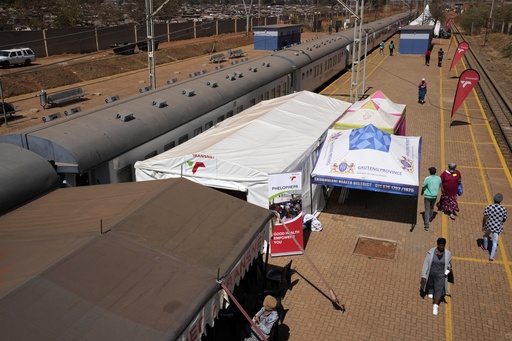
Thethiwe Mahlangu, a resident of a South African township, chose to visit a mobile health facility on a converted passenger train named Phelophepa, which means “good, clean, health” in the Sesotho language, instead of her local health clinic. This unique train has been providing essential medical care to communities across South Africa for the last 30 years, reaching about 375,000 individuals annually, many of whom struggle to access healthcare services at overcrowded clinics. The train offers free healthcare, contrasting the strained public health system that the majority of South Africans rely on.
Healthcare in South Africa mirrors the significant social inequality in the country. Only 16% of the population has access to health insurance, leaving many unable to afford private healthcare plans due to high unemployment rates exceeding 32%. In an attempt to bridge this gap, President Cyril Ramaphosa signed the National Health Insurance Act earlier this year, aiming to provide funding for millions without health insurance to receive care from the more well-equipped private sector. However, the law has sparked division, with concerns raised about funding sources, potential tax increases, and the possibility of corruption in the new system.
For individuals like Mahlangu, who seek free treatment on the health train due to dissatisfaction with local clinics characterized by long wait times, medication shortages, and unfriendly staff, the mobile facility provides a much-needed alternative. The train, operated by the Transnet Foundation, has expanded from a small three-carriage initiative to two 16-carriage trains over the years, catering to the healthcare needs of communities in urban areas like Pretoria and Johannesburg.
Despite the efforts of the health train and increases in healthcare budgets and public sector healthcare employment since the end of apartheid, concerns remain about widespread corruption undermining the effectiveness of the public health system in South Africa. The African National Congress, the ruling party post-apartheid, has been criticized for allowing corruption to detrimentally impact public services, including healthcare.
As the health train continues to offer vital services to underserved communities, individuals like Mahlangu and Jane Mabuza express satisfaction with the care received on the train, highlighting the urgent need for accessible healthcare solutions in South Africa.
